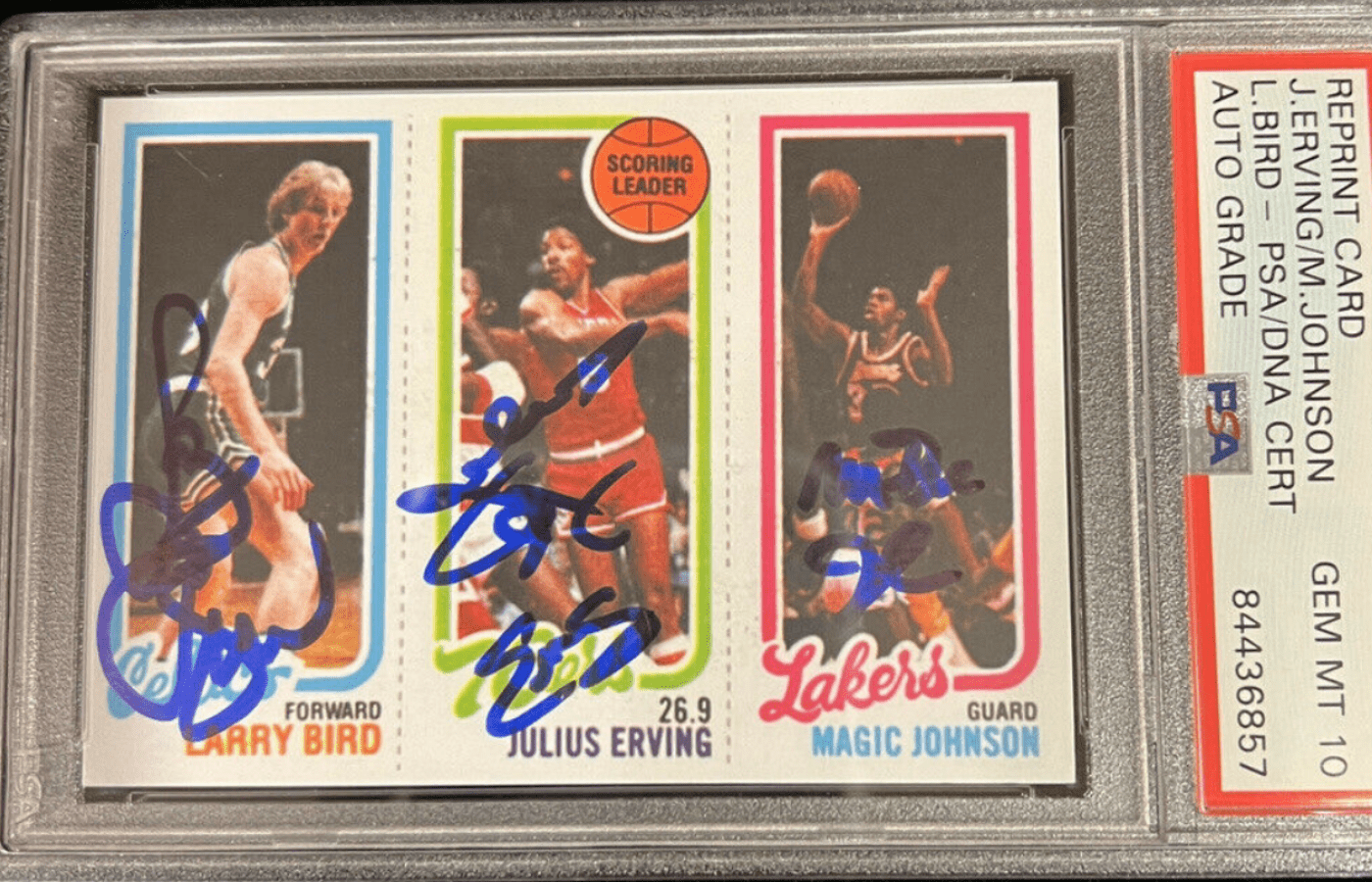There are so many ways people can pull scams on trading card collectors. Con artists have developed innovative ways to doctor cards through trimming, photocopying, editing and etc. Many of these look so good they get past some of the top grading organizations like PSA.
So, will PSA grade a reprint? Yes, they will. They either do this intentionally or by mistake, depending on the reprint. In some cases, it’s embarrassing, but in others, it’s useful, especially for cards with an original limited distribution.
If you think your card should go to PSA, be sure first to do your own inspection. That said, it is a good way to get a card authenticated to see if they’re real or a reprint.
How Do You Tell if a Trading Card Is a Reprint?
First, it’s important to understand that not all reprints are counterfeit. Some are genuine reissues. But, you do want to be able to detect it so you can understand if it’s worth anything and if it is, what that value will be.
The best way to check a reprint is to compare it with one or more of the genuine card. While you may not have a duplicate, you can find some online. Alternatively, you could check with your local trading card store.
PSA Recommends using Card Saver 1’s when submitting cards for grading. To check the current price and availability of Card Saver 1 Sleeves, click here to view the selection on Amazon.
Your Own Inspection
When in doubt, try to locate a professional card collector to help you identify whether the card is genuine or not. However, it’s advisable to study the history of the card, when the manufacturer printed it and if they issued any official reprints.
- Clear Differentiations: Staining will darken a card, and shorter cards could result from wear-and-tear or trimming. This can also include copyright date or other text stating the card is a reprint.
- Weight: If there’s a significant difference between the weight of the cards, this can signify a reprint. However, this isn’t always true. It depends on if the manufacturer is consistent with the cardstock they use.
- Front; Back: If you have a card to compare, check the front and back with a magnifying glass. Look at the ink, markings, centering, and size.
- Printing: Inspect text, images, borders and etc. For instance, if the image of your card is larger than a genuine one, chances are it’s a reprint or a fake.
- Solidity: With the magnifying glass, compare and contrast the areas with solid color. If there’s a noticeable difference in the solid areas, it may very well be a reprint.
- Cardstock: Color, feel, texture, and thickness will all be necessary. Certain glossiness, especially on older cards, is difficult to duplicate on a reprint, and every reprint will contain a different type of gloss than the genuine one. The edge of the card shows variations in cardstock.
- Lettering ; Borders: Look at the font and lines used on the card. Are they thicker or thinner than the original? Are they off-center or not in the same place as on the original? Is the font itself the same?
- Signs of Reproduction: Computer generation or photocopies will be very obvious and noticeable. The quality reduces by 5% to 10% on the reprint compared to the original. There will be white marks, spots, lines and etc, to indicate that the card is a copy.
- Light: When you put your reprint before a light, some illumination should come through the cardstock and the ink. Compare the light passing through the original card and the card in question. The card is counterfeit or a reprint if there’s a noticeable difference in opacity.
- Black Light: Using real-deal black light is a good way to test fluorescence. This is probably the most surefire way to see if a card is true or a reprint. You’ll see this in the cardstock, the ink, and the overall appearance of the card.
Related: Is PSA Card Grading in Canada? Yes, And This is How to Use it
Can PSA Graded Cards Be Fake?
Yes, some PSA graded cards can be fake. They sneak through the authentication process and, sometimes, PSA will grade them. As a matter of fact, PSA’s fame comes from a fake graded card. Wayne Gretzky submitted a T206 Honus Wagner that PSA graded with an 8 near mint-mint.
They kept this grade even though it wasn’t long before the discovery of doctoring. They still hold the grade to this day. Plus, there was a scandal in 2019 where a card doctor killed off thousands of fake cards authentically graded by PSA. The company is eschewing responsibility.
These things are hardly mishaps or mistakes. These are outright false practices that PSA is standing by. Plus, this is easy for PSA to do, seeing as how Joe Orlando, CEO of Collectors Universe, admitted in a press conference that they take only 30 seconds to grade a card.
Are There Fake PSA Cards?
Yes, there are fake PSA card. The best way to decipher if a card is a fake PSA is by inspecting the slab, the certification number, and the label. Every slab will have a certification number you can search for directly on PSA’s website.
Regarding the label, you should be able to see the lettering when you hold it up to light. Also, the label should fit the upper section of the slab. If anything is amiss, it’s a fake.
Final Thoughts
Even though some reprints are reissues of an original card, there are many counterfeits. So, it’s best to inform yourself about the card in question. See if the manufacturer issued any reprints of the card you’re looking at.
If not, inspect the card against a genuine version of it. In many cases, you should be able to find them online. But, you may have to go to a trading card store or establishment in your area for assistance.
It’s about having a keen eye. You want to detect imperfections, inconsistencies, and mistakes with the cardstock, ink, printing methods, and other indicators as mentioned above.


